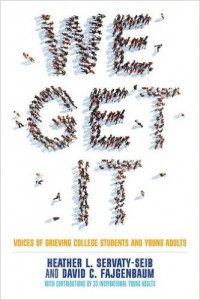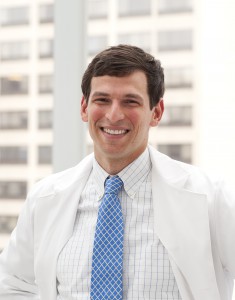Editor: In anticipation of tomorrow’s AfterTalk BlogTalk Radio program featuring Dr. David Fajgenbaum and his colleague Dr. Heather Servaty-Seib, we are reprinting their two-part article on supporting grieving college students. You can listen to the initial broadcast at 3pm tomorrow, November 18 at AfterTalkLIVE on BlogTalk Radio, or later in the AfterTalkLive archive. To listen, click this link:
Between 35% and 48% of college students have lost a family member or close friend within the last two years. Grieving college students and young adults can often feel isolated and vulnerable, and may feel that no one else ‘gets’ what they are going through. In the first part of this two-part post, co-author of We Get It, David Fajgenbaum says in his own words how he aims to provide guidance and support for bereaved students and young adults.
Losing a loved one at any age is difficult. But there are certain things about college and young adulthood that can make it a particularly difficult time to grieve. We’re often away from home for the first time and/or at college. We’re going through an intense period of personal and professional development. We’re swamped with assignments or work tasks. We’re often geographically far from our ill or grieving loved ones. We’re supposed to have the “best four years of our lives” and be worry free. Despite having other grieving young adults all around us (one out of three college students reports grieving in the last year), we can and often do feel completely alone and believe that there is no one around us who “gets” what we are going through.
We get it. These are some of the reasons that Heather and I have dedicated much of our lives to helping grieving college students  and young adults. Heather has published bereavement research, advocated for young adult grievers as the President of the Association for Death Education & Counseling, and helped to establish one of the only student bereavement leave policies in the nation on her campus at Purdue University. I established a peer-led grief support group at Georgetown University after my mom died, grew the organization into a national movement (AMF) that has reached 3,000+ grieving students on 200+ campuses, and helped to propel college student grief to become a priority issue in higher education in the United States.
and young adults. Heather has published bereavement research, advocated for young adult grievers as the President of the Association for Death Education & Counseling, and helped to establish one of the only student bereavement leave policies in the nation on her campus at Purdue University. I established a peer-led grief support group at Georgetown University after my mom died, grew the organization into a national movement (AMF) that has reached 3,000+ grieving students on 200+ campuses, and helped to propel college student grief to become a priority issue in higher education in the United States.
But four years ago, Heather and I connected over our mutual concern for all of the students not being reached by my nonprofit and not benefiting from Heather’s research and outreach. We had seen the impact that can be made on a griever’s life when they receive the support they desperately need, and we knew there were many more around the world in need of support and of connection with others who “get it.” Some individuals are able to find and connect with those with similar experiences of loss, whereas others are never able.
We assembled a book of autobiographical narratives written by 33 grieving college students and young adults for grieving college students and young adults. We believe these narratives can give readers a voice and the courage to share their grief experiences with others. We have discovered that one of the most powerful experiences for grieving individuals is to hear even a small element of their own experience being expressed by another. We wanted to make this experience possible for all, regardless of their access to others with similar experiences.
This book provides a window into the many grief reactions and mourning approaches of 33 grieving students and young adults. These young adults contributed their stories to this book to make a difference in the lives of future grieving students through sharing their stories–through showing that they “get it.” Rather than providing a prescription for how grief should be done, they genuinely describe the thoughts, feelings, and behaviors they experienced throughout their grief journeys. The power of this book is in the candid, engaging, and heartfelt sharing contained in these stories. We have offered the whole narratives, organized them based on themes, and provided commentary and reflection questions at the end of each chapter to help grievers to keep actively moving forward. We are so grateful for their beautifully-written stories.
If you are a grieving college student or young adult, we hope our book will be helpful for you and that you will find multiple points of connection as you read. This book was also written to offer guidance to those who want to support grieving college students and young adults, including family members, friends, counselors, professors, or university staff members. If you fall into this group, we hope that this book will provide helpful insights into the unique and dynamic nature of grief.
I’d like to close by sharing some of the lessons I’ve learned through my own grieving process and work:
First, helping others through support and community service has been very therapeutic for me , and I’ve heard this from many of our AMF members. The community service component is a particularly helpful way to get guys, like myself, to confront some of their emotions – through actively doing something. Along the same lines, I also get tremendous therapeutic benefit from dedicating my life to fighting cancer. Second, the power of peer support and being able to speak with others who “get it” cannot be underestimated; my support group at Georgetown was my lifeline. Third, we all express our emotions differently, so it is essential that we encourage people struggling with grief to express their emotions in whatever way is most helpful for them. Fourth, even though it has been over 10 years, I still miss my mom and wish that she were still here. But the sadness and intensity has certainly decreased over the years, so that I’m able to integrate my memories and the lessons she taught me to be able to actively move forward.
[Editor: to order We Get It from the AfterTalk Bookstore, click the picture above.]
David C. Fajgenbaum, M.D., MSc, is a Research Assistant Professor of Medicine in the Division of Hematology/Oncology at the University of Pennsylvania and the co-founder of the National Students of AMF Support Network, a non-profit organisation dedicated to supporting college students grieving the illness or death of a loved one. Dr. Fajgenbaum co-founded the organizationin 2006 in memory of his mother, Anne Marie Fajgenbaum (AMF). The organization is now a national movement that has supported 3,000+ students on 200+ campuses and raised national awareness about college student grief. AMF now stands for “Actively Moving Forward.” David has been profiled on Forbes Magazine’s 30 Under 30 list, the Today Show, Reader’s Digest, and 40 million bags of Doritos. David received his BS from Georgetown University, his MSc in Public Health from Oxford University, his MD from the University of Pennsylvania, and his MBA from The Wharton School of Business. Dr. Fajgenbaum lives in Philadelphia, PA.

